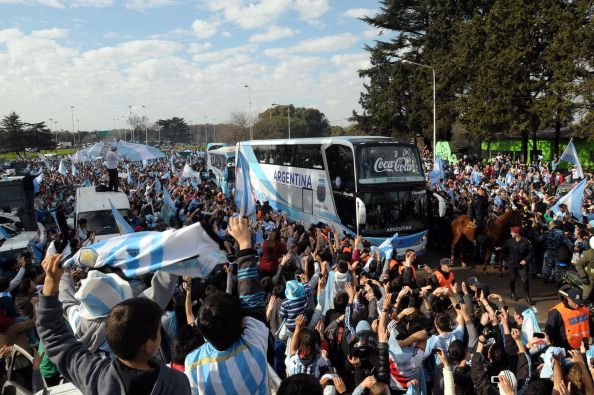
Dear Argentina, the Albiceleste fans salute you
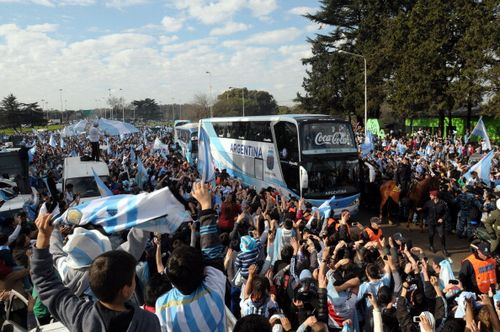
It has been an overwhelming experience to have been a part of the vast fan base of Argentina and following their progress at the World Cup. With decades of rich footballing history, the Albicelestes are one of the marquee teams of international football and it is an honour to be a part of a generation that witnessed footballing legends starting from Diego Maradona to Lionel Messi, not to forget the greatness of Gabriel Batistuta and other heroes like Hernan Crespo and Javier Mascherano.
La Albiceleste were considered to be strong contenders for the 2014 FIFA World Cup in Brazil and they did not fail to impress their loyalist fan base. Albeit they could not put their hands on gold, but nevertheless with moments of sheer footballing magic this was surely considered as one of their greatest performances in the last 25 years of world football. But alas, the much feared German ghosts of the past did come back to haunt them when it counted the most – the World Cup final.
Group stage and Round of 16
The group stage saw La Albiceleste start off on a 3-5-2 strategy that was criticized despite having one of the strongest attacking lineups in present day international football, especially against Bosnia and Herzegovina. The defence was considered one of the weak points. The talismanic Lionel Messi saw us through the group stage scoring in every game. The dead ball situation against Nigeria brought out the best in him and a free kick which combined accuracy and precision definitely made it one of the best free kicks of Brazil 2014. La Albiceleste started showing their master class gradually as the tournament progressed and breezed through the group stage with ease, despite carrying the burden of a weak defence on their shoulders, and the injury to Sergio Aguero to add to the woes.
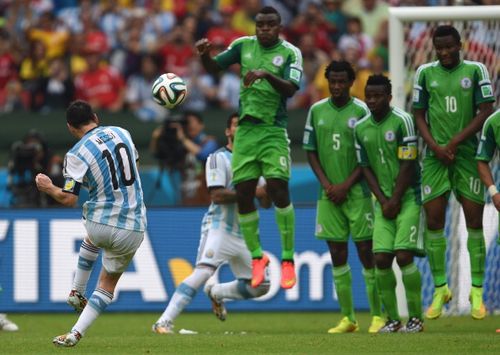
It was in the round of 16 that the Argentines went up against a spirited Switzerland and the likes of Xherdan Shaqiri and Granit Xhaka, who were in prime form. Despite a strong show put up by the Swiss, it was the again the duo of Lionel Messi and Angel Di Maria who scored late in extra time to seal the deal. The defence, once again proved to be the weak point, with Sergio Romero nearly letting the Swiss go past him owing to his two minds on whether to attack or stay back protecting his goal.
The Quarter-Final
Fans began worrying about the performance of the defence should Argentina go up against the likes of Netherlands, Germany and arch rivals Brazil, who were known for their attacking style of play. It was the quarter-finals and Argentina went up against a highly rated Belgium side, comprising of world class players like Eden Hazard, Romero Lukaku and Vincent Kompany. The match started on a tense note and it was Gonzalo Higuan, the underperforming striker, who emerged as the goal scorer as early as the fifth minute, albeit with a stroke of luck but nevertheless got us through to the semi-finals. The defence looked seemingly improved, but one of the stars of the attacking midfield Angel Di Maria limped out of the World Cup with injury.
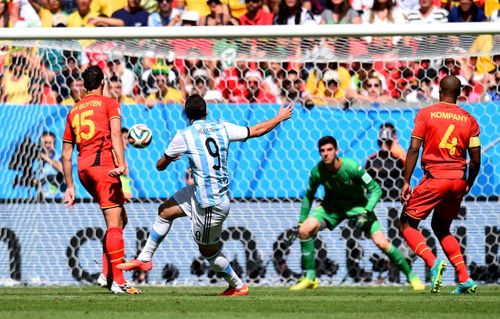
Up against the Netherlands in the semi-final
Argentina was up against Netherlands in the second semi-final; a day after the Germans shattered the hopes of Brazil and left most of the country in tears, storming their way into the final at Estádio Maracanã. The Netherlands had practically ripped apart Spain in their first game, netting the ball on five occasions. Argentine fans were in for a surprise treat when the defence played exceptionally well. They had mastered their weak point and made it their strength, with immaculate marking on the Netherlands attack, with Mascherano and Zabaleta specifically targeting Arjen Robben and laying offside traps for the dangerous Robin van Persie.
Even the tactical genius of Louis van Gaal could not find a way through the resilient Argentine defence, eventually carrying the match to extra time and then to penalties to decide a winner. The record of Netherlands never scoring in extra time and Argentina never conceding in extra time were kept intact. With the help of motivating words from Javier Mascherano, it was Sergio Romero who emerged as the hero for the Argentines, denying two penalties from Ron Vlaar and Wesley Sneijder respectively.
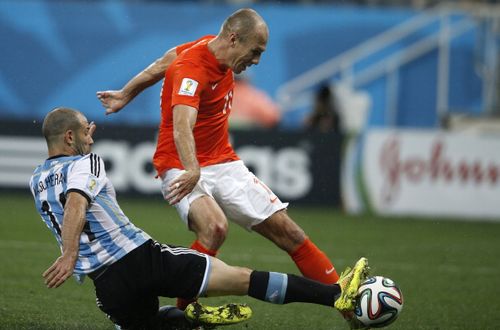
Maxi Rodriguez held his nerve and scored from the fourth penalty kick taking the Argentines to the final against Germany. Fans witnessed an adrenaline-charged semifinal clash between two different cultures of football, with the South Americans emerging as the winners. The decision to substitute Van Persie in such a significant match would definitely be regarded as a crucial factor in the result.
The World Cup Final
13th July, 2014. Estádio Maracanã at Rio was the venue for showdown between two of the biggest arch rivals in football. It was the third time that a World Cup Final was being played between Argentina and Germany, with each of them winning it once. La Albiceleste were desperate to win their first final in years and the Germans were looking for their first World cup triumph since the union of their country.
The match started with Gonzalo Higuan being presented with a golden chance of scoring early by virtue of a slip-up from Toni Kroos, which he failed to convert skewing the ball wide of the goal, with many touting it as the miss of the tournament. Nevertheless Higuan was one of the reasons Argentina were in the finals in the first place, by virtue of his strike against Belgium. The first half saw great number of counter attacks by Argentina with most of them terminating deep inside the German penalty box, with glimpses of sheer magic from Lionel Messi.
Both teams went close to scoring with a number of chances, with Higuain once again failing to overcome the cunning offside trap by the Germans. The hard working Ezequiel Lavezzi was surprisingly replaced by Sergio Aguero in the second half and Gonzalo Higuan was replaced by Rodrigo Palacio, more famous for his hairstyle than his performance in this World Cup. Even Lionel Messi missed a golden chance to take Argentina home in the second half.
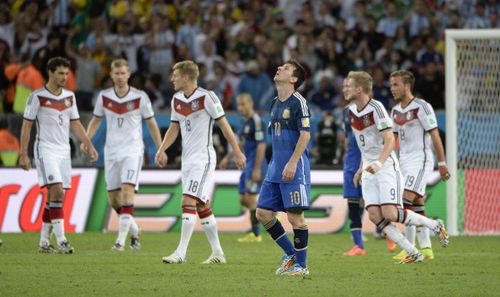
Argentina failed to score in spite of utilizing most of its substitutions’ thereby taking the match into extra time. It was late in the second half of extra time that Mario Götze, one of the most exiting talents in the German armoury, scored the lone goal in the World Cup final, with André Schürrle providing the assist. The goal that gave Germany the first world cup triumph after 24 years.
Takeaways for Argentina
FIFA 2014 Brazil saw a number of talking points for Argentine football. With talks of the tactical transformation from an attacking minded team to becoming a team with a defensive mentality, to the various injuries suffered by Sergio Aguero and Angel Di Maria. However, the most talked about subject was the comparison between Diego Maradona and Lionel Messi during the World Cup campaign. The comparison between two legends of Argentine football was fueled by the World Cup final clash between Argentina and Germany, with Maradona leading Argentina in 1986 and Lionel Messi leading them in 2014; both of them in similar stages of their respective careers.
Though La Albiceleste could not win the World Cup this time, they were successful in impressing their vast loyalist base and they did leave an everlasting impression in the hearts of their fans. One goal might be enough for Germany to win the World Cup, but definitely not enough from deterring Argentina fans to salute their heroes – the era of legends that we saw whilst transforming from infant football fanatics to mature football loyalists.
Argentine football is not only about a comparison between Diego Maradona and Lionel Messi. It’s about the culture and rich tradition of their football, it’s about the numerous legends who gave their entire lives to playing football, it’s about the numerous Messi and Maradona wannabes in the outskirts of Buenos Aires and Rosario, and it’s about the rich history of footballing superstars that carried on their tradition from the time of Maradona to Messi.
From a true Argentine football loyalist, “La Albiceleste, we salute you!” Thank you for everything that you have given us, for every footballer that you have produced, for every match that you have won, for every goal that you have scored. You will truly be held high in our hearts. We love you!